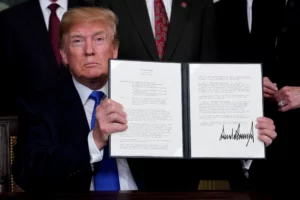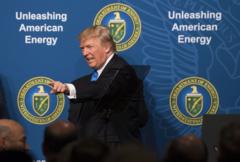Prime Minister Trudeau of Canada and European leaders decry President Trump's 25% tariffs on steel and aluminum, warning of potential retaliatory measures that could impact U.S. allies and disrupt trade dynamics.
**Nations React Strongly to Trump’s Tariffs on Steel and Aluminum**

**Nations React Strongly to Trump’s Tariffs on Steel and Aluminum**
Countries criticize trade measures as unjustified and threaten retaliation, escalating tensions in international economic relations.
Canada, Mexico, and various European nations have vocally opposed recent tariffs imposed by President Trump on steel and aluminum, describing them as "unjustified" and "unacceptable." These tariffs, which will take effect on March 12, have raised concerns about the onset of a global trade confrontation, potentially destabilizing economic markets and straining diplomatic relations.
Canadian Prime Minister Justin Trudeau, emphasizing that Canada is the U.S.'s largest source of both metals, has urged for reconsideration of the tariffs. He expressed that the measures would have detrimental repercussions for both American and Canadian economies, highlighting the interwoven nature of their trade. Trudeau mentioned that Canada is prepared to coordinate with international allies to apply pressure on the Trump administration if necessary. He also indicated readiness to implement countervailing tariffs should the situation escalate.
Similarly, European officials, including Ursula von der Leyen, President of the European Commission, condemned Trump's decision, labeling it as unwarranted and potentially harmful to transatlantic relations. European leaders expressed their intention to respond if the tariffs proceed, raising fears of retaliatory actions that could exacerbate the trade disputes.
Furthermore, leaders from Mexico criticized the tariffs as lacking justification, asserting that such actions jeopardize the economic integration achieved through years of North American collaboration. The growing discontent suggests that these tariffs could ignite significant trade tensions, challenging the fabric of international economic alliances and market stability moving forward.
Canadian Prime Minister Justin Trudeau, emphasizing that Canada is the U.S.'s largest source of both metals, has urged for reconsideration of the tariffs. He expressed that the measures would have detrimental repercussions for both American and Canadian economies, highlighting the interwoven nature of their trade. Trudeau mentioned that Canada is prepared to coordinate with international allies to apply pressure on the Trump administration if necessary. He also indicated readiness to implement countervailing tariffs should the situation escalate.
Similarly, European officials, including Ursula von der Leyen, President of the European Commission, condemned Trump's decision, labeling it as unwarranted and potentially harmful to transatlantic relations. European leaders expressed their intention to respond if the tariffs proceed, raising fears of retaliatory actions that could exacerbate the trade disputes.
Furthermore, leaders from Mexico criticized the tariffs as lacking justification, asserting that such actions jeopardize the economic integration achieved through years of North American collaboration. The growing discontent suggests that these tariffs could ignite significant trade tensions, challenging the fabric of international economic alliances and market stability moving forward.





















